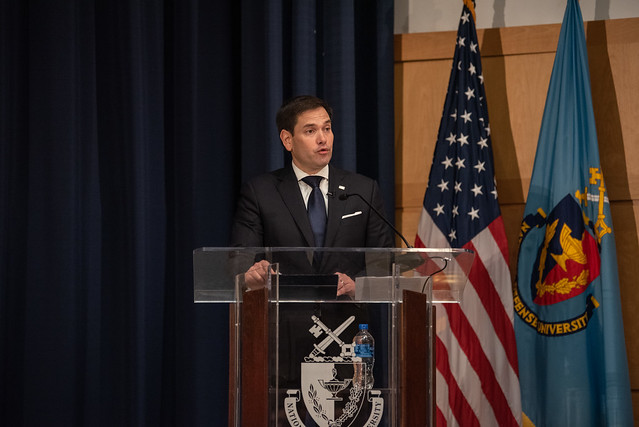Post-Midterms: The Democratic Party’s Radicalized Foreign Policy

Thanks to the methodical takeover of its party institutions and non-profits by an energized philanthropic project beginning after John Kerry’s loss in the 2004 presidential election, the Democratic Party has undergone what can only be described as a radicalization process. After the donor class moved leftward, a new, woke generation—concerned with microaggressions, social justice, and stamping out contrary opinions deemed “hateful”—took the reins of media and culture. It’s been a mad dash to the extremities of reason and imagination ever since. Democratic candidates, elected officials and media voices today would no doubt be described as some synonym of “lunatic” or “extreme” by Democrats of decades past.
Even as we don’t have a contentious military endeavor with which the Left could take its traditional role in support of America’s enemies in combat, the radicalism of this new crop of progressive House Members like Alexandria Ocasio-Cortez and Minnesota’s Ilhan Omar manages to express itself on issues of foreign affairs and national security. This radicalism has led Democrats to reevaluate their position on America’s traditional alliances no less than they’ve reevaluated their support for free speech or capitalism.
The Democrats’ shift here comes in the wake of the most substantial legacy Barack Obama left for us in foreign affairs: a relatively binary Middle East, with America’s traditional allies alienated and disempowered in order to favor Iran and Sunni Islamist movements. When Donald Trump entered the White House, Iranian Shiite proxies had come to occupy, influence or get within striking distance of the Arab capitals of Beirut, Baghdad, Damascus, and Sana’a in Yemen. Over the course of the last half-dozen years, the Arab Spring’s Muslim Brotherhood coups had endangered allied regimes in Egypt, Jordan, and Saudi Arabia. Led by ideological motivations similar to the Bush “Freedom Agenda,” the prior administration emboldened both these Sunni and Shia varieties of political Islam, earning the enmity of old allies Israel, Egypt, Saudi Arabia and the United Arab Emirates. It was really only a matter of time until the realities of this Middle East realignment influenced Members of Congress.
The hard-left’s antipathy toward our closest Middle Eastern ally, Israel, comes from the aftermath of the Six Day War in 1967 and has been growing in intensity since. Once the province of the hard, Soviet-aligned academic Left, the comprehensive triumph of the New Left’s narrative of imperialism in foreign affairs has blown the legs out from under what was once the “bipartisan consensus” in support of Israel. With an empowered Democratic Party, pushed by an ever-more-radical media, look for an unprecedented amount of hostility toward the Jewish State from the upcoming 116th Congress’ newest, most energetic Democratic Members.
It’s not just those who care about the US-Israel relationship who need to be concerned about what comes next. The president’s warm relations with the Gulf monarchies are, like his relationship with the Israelis, born of longtime social and business partnerships that are married, now, to the strategic reality of the moment: combating both Iran’s malign influence in the region, as well as the advance of Sunni political Islam in the form of the Islamist Muslim Brotherhood.
Last month’s murder of Jamal Khashoogi exposed the most prominent voices on the Left as, suddenly, avowed enemies of the American alliance with Saudi Arabia and its young crown prince, Mohamed Bin Salman. Suddenly, lobbyists, politicians and corporations responsive to social justice concerns caved quickly to an orchestrated anti-Saudi campaign; they ignored decades-long relationships built on financial and strategic national interests, pulling out of business ventures, contracts and events in the Kingdom. The campaign to do so was successful because it was only bringing this elite, left-leaning class into line with the pro-Iran, pro-Islamist foreign policy cemented by the Obama White House.
The Khashoogi affair fed into the binary nature of the Middle East today, becoming a target of opportunity for Turkish, Qatari, Brotherhood and Iranian information operations to exact punishment on its hated rival in Riyadh; as if on cue, the Democrats have promised to put the screws to Saudi Arabia over its war against the Iranian proxy in Yemen.
Of course, some of this is new hostility is born of anti-Trump partisanship and a simple “Orange Man Bad” mental tic—if Trump likes a country or its leader, we must loathe them. More sophisticated congressional Democrats understand the binary strategic implications of moving away from the Israelis and the Saudis in particular and protecting a long-hoped-for detente with Iran, even if it comes at the cost of alienating America’s traditional regional allies.
Needless to say, none of this behavior is the country’s best interest. It’s a big deal—and indicative of major structural problems with our Republic—when the partisan divide is so strong that it colors our views of allies and adversaries. We really are, at this stage, two distinct countries sharing common nation, with completely divergent understandings of commerce, government, culture, and justice. Add to this, now, a widening gulf between the foreign nations some of us embrace and those others find threatening to their way of life.
The American Mind presents a range of perspectives. Views are writers’ own and do not necessarily represent those of The Claremont Institute.
The American Mind is a publication of the Claremont Institute, a non-profit 501(c)(3) organization, dedicated to restoring the principles of the American Founding to their rightful, preeminent authority in our national life. Interested in supporting our work? Gifts to the Claremont Institute are tax-deductible.
Senator Marco Rubio speaks at National Defense University on the need for a ‘pro-American industrial policy’ to counter China.
Five lessons U.S. military public affairs should learn from IDF’s information fighters.


